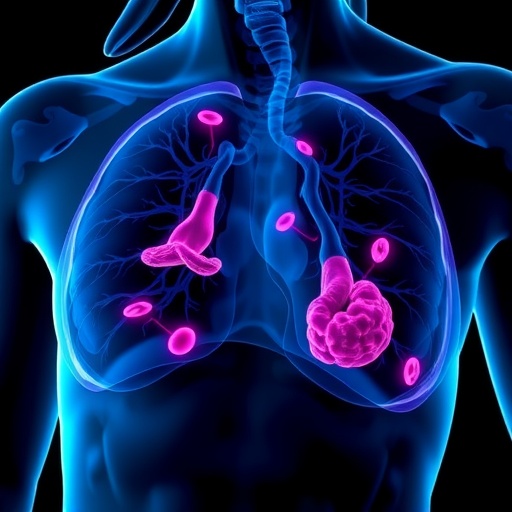In a groundbreaking study poised to reshape our understanding of breast cancer progression in patients with metabolic disorders, researchers at Boston University’s Chobanian & Avedisian School of Medicine have unveiled a crucial link between type 2 diabetes and the aggressive behavior of breast tumors. Published in Communications Biology and spearheaded by Dr. Gerald Denis, this pioneering research provides compelling evidence that plasma exosomes—nanometer-sized extracellular vesicles—circulating in the blood of individuals with type 2 diabetes radically alter the immune landscape within breast tumors, thereby compromising anti-tumor immunity and facilitating cancer growth and metastasis.
Type 2 diabetes, a metabolic disorder characterized by insulin resistance and chronic hyperglycemia, affects over 120 million people in the United States alone, many of whom face an elevated risk of cancer mortality. While epidemiological data have long suggested that diabetic patients experience poorer breast cancer outcomes, the biological underpinnings remained obscured until now. Dr. Denis and his team employed cutting-edge patient-derived organoid cultures, a 3D tumor modeling technique that preserves the native architecture and immune microenvironment of breast cancers, to dissect the molecular dialogue between diabetic plasma exosomes and tumor-infiltrating immune cells.
The study meticulously isolated exosomes from the blood plasma of individuals with type 2 diabetes and non-diabetic controls, all devoid of known cancer, to tease apart the influence of metabolic disease on tumor biology independent of tumor-derived factors. These exosomes were then applied to patient-derived breast tumor organoids, enabling researchers to investigate functional changes within the tumor milieu at single-cell resolution using advanced RNA sequencing technologies. This innovative approach enabled unprecedented insight into how metabolic dysregulation might pivotally impair intrinsic immune surveillance mechanisms.
Results demonstrated that exosomes from diabetic donors induce a reprogramming of immune cells within tumor tissues, fundamentally weakening their ability to mount effective anti-cancer responses. Immune effector populations, including cytotoxic T lymphocytes and natural killer cells, exhibited suppressed activity and altered gene expression profiles after exposure to diabetic exosomes. Correspondingly, organoids treated with these exosomes displayed enhanced tumor cell proliferation, indicative of accelerated cancer aggression and potential for metastasis.
This immune suppression appears to be mediated by specific molecular cargo within the diabetic exosomes, such as microRNAs and proteins, which modulate signaling pathways crucial for immune cell activation and tumor surveillance. By dampening the tumor’s immune microenvironment, these exosomes effectively create a permissive niche where cancer cells evade immunological destruction, a phenomenon that may partly explain the diminished efficacy of immunotherapies observed in diabetic breast cancer patients.
The significance of this research is amplified by the preservation of the tumor’s native immune context in organoid cultures, making the findings highly translatable to clinical scenarios. Such patient-specific models are a leap forward from traditional cell lines, which often lack the complex interplay of immune and stromal cells critical for comprehensive cancer biology understanding. This model thus provides an invaluable platform for testing therapeutic interventions aimed at counteracting immune suppression induced by metabolic factors.
Moreover, the findings suggest the urgent need to stratify cancer patients based on metabolic health, particularly diabetes status, when considering immunotherapeutic regimens. The current one-size-fits-all approach in oncology overlooks how systemic diseases like diabetes reshape tumor-immune interactions, possibly undercutting the success of cutting-edge treatments. Tailoring therapies to restore immune competence in diabetic patients may not only improve response rates but also curb cancer progression more effectively.
Recognizing the wider implications, the research team envisions expanding the investigation into other solid tumors where type 2 diabetes is prevalent, such as pancreatic and colorectal cancers. Given the centrality of immune evasion in cancer progression, it is plausible that similar exosome-mediated immune modulation occurs across diverse cancer types, further entrenching metabolic disease as a critical factor in oncology.
Discussing the complex pathophysiology, Dr. Denis emphasized that diabetes-induced changes in exosome content likely arise from metabolic stress and inflammation characteristic of diabetic physiology. These altered exosomes represent a systemic conduit by which metabolic disease exerts long-range effects on distant tissues, in this case, transforming the tumor microenvironment. This insight opens new avenues for biomarker discovery, where circulating exosomes could serve as predictive indicators of tumor behavior and patient prognosis.
Technologically, the use of single-cell RNA sequencing in this context provides granular data on heterogeneous immune cell populations within tumors, revealing nuanced shifts in phenotypes and functional states orchestrated by diabetic exosomes. Such resolution is crucial for identifying targetable pathways underpinning immune suppression and for the design of precision immunotherapies.
Importantly, the study received funding support from notable National Institutes of Health grants, underscoring the critical role of federal investment in pioneering medical research. Collaborations between clinical oncology, cellular biology, and metabolic disease experts were instrumental in achieving these insights, highlighting the importance of interdisciplinary approaches in tackling complex biomedical problems.
In sum, this research marks a paradigm shift in understanding how metabolic disorders like type 2 diabetes intricately alter cancer biology beyond mere epidemiological associations. It underscores the imperative to consider the systemic metabolic state in cancer treatment planning and opens promising paths toward developing personalized, metabolism-informed therapeutic strategies that could improve survival and quality of life for millions of cancer patients globally.
Subject of Research: Human tissue samples
Article Title: Plasma exosomes from individuals with type 2 diabetes drive breast cancer aggression in patient-derived organoids
News Publication Date: 26-Aug-2025
Keywords: Breast cancer cell lines, Diabetes




